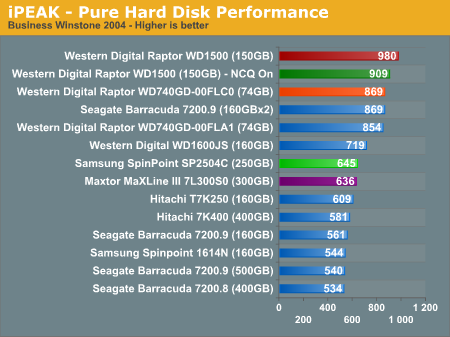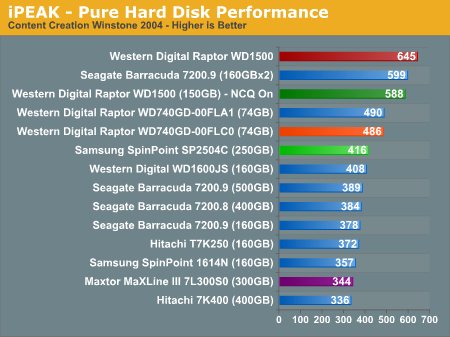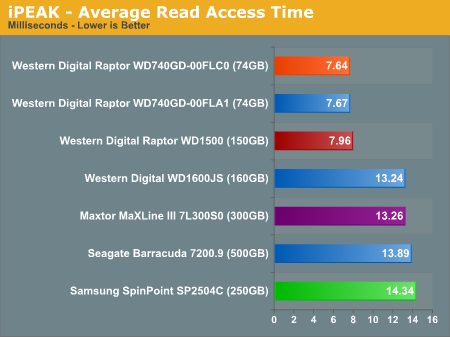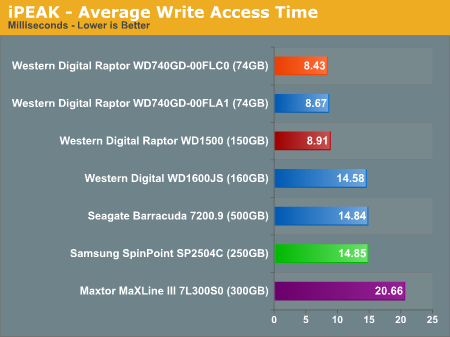Western Digital WD1500ADFD: King Raptor
by Gary Key on February 8, 2006 1:30 AM EST- Posted in
- Storage
Hard Disk Performance: iPEAK
We played back Anand's raw files that recorded I/O operations when running a real world benchmark - the entire Winstone 2004 suite. Intel's iPEAK utility was then used to play back the trace file of all I/O operations that took place during a single run of Business Winstone 2004 and MCC Winstone 2004. The drive was formatted before each test run and a composite average of 3 tests on each drive was tabulated in order to ensure consistency in the benchmark.
iPeak gives a mean service time in milliseconds; in other words, the average time that each drive took to fulfill each I/O operation. In order to make the data more understandable, we report the scores as an average number of I/O operations per second so that higher scores translate into better performance.
The performance of the Raptor WD1500 is extremely impressive and represents a 13% increase over the Raptor 740GD in the Business Winstone test and an incredible 33% increase in the Content Creation Winstone test. Turning NCQ on results in a hit of 8% in the Business Winstone test and 9% in the Content Creation Winstone test. Although the drive maintains excellent performance with NCQ activated we highly recommend turning it off when used in a single-user environment. While the WD1500 random access times are slightly higher than the Raptor 740GD, the overall performance of this drive is consistently better. The Samsung SP2504C provides excellent results considering the bargain pricing on the drive and leads the Maxtor 7L300S0 in most of the test results.




We played back Anand's raw files that recorded I/O operations when running a real world benchmark - the entire Winstone 2004 suite. Intel's iPEAK utility was then used to play back the trace file of all I/O operations that took place during a single run of Business Winstone 2004 and MCC Winstone 2004. The drive was formatted before each test run and a composite average of 3 tests on each drive was tabulated in order to ensure consistency in the benchmark.
iPeak gives a mean service time in milliseconds; in other words, the average time that each drive took to fulfill each I/O operation. In order to make the data more understandable, we report the scores as an average number of I/O operations per second so that higher scores translate into better performance.
The performance of the Raptor WD1500 is extremely impressive and represents a 13% increase over the Raptor 740GD in the Business Winstone test and an incredible 33% increase in the Content Creation Winstone test. Turning NCQ on results in a hit of 8% in the Business Winstone test and 9% in the Content Creation Winstone test. Although the drive maintains excellent performance with NCQ activated we highly recommend turning it off when used in a single-user environment. While the WD1500 random access times are slightly higher than the Raptor 740GD, the overall performance of this drive is consistently better. The Samsung SP2504C provides excellent results considering the bargain pricing on the drive and leads the Maxtor 7L300S0 in most of the test results.










51 Comments
View All Comments
Gary Key - Monday, February 20, 2006 - link
Maybe we should do a RAID 5 test only.....the RAID 0 results are what you expect them to be at this time, very good in two system benchmarks but slower in a couple of games..... ;->
mlittl3 - Wednesday, February 8, 2006 - link
Here you go.http://www.gamepc.com/labs/view_content.asp?id=rap...">http://www.gamepc.com/labs/view_content.asp?id=rap...
http://www.tomshardware.com/2006/02/06/wd1500ad_ra...">http://www.tomshardware.com/2006/02/06/wd1500ad_ra...
Two articles with raid numbers.
Wesley Fink - Wednesday, February 8, 2006 - link
The THG review only compares a single 150 Raptor to a RAID 0 with slower drives, but it does use a few real-world benchmarks. The other review tests RAID 0 with these Raptors but only uses synthetic benchmarks. Synthetic benchmarks are useful, but they are only part of the performance picture. Results with real-world benchmarks - particularly in RAID 0 - are very different.Live - Wednesday, February 8, 2006 - link
The tests linked are not very good. GamePC uses synthetic benchmarks which are not indicative of real world desktop performance. The Iometer in particular is not useful for single user scenarios and never was. Basically Gamepc doesn’t know what they are doing (or since they sell the stuff maybe that’s just what they do...)We all RAID-O improves performance a lot in Synthetic benchmarks. It does however not do the same for real world tests and certainly not in a cost effective way. I highly doubt SATA or this new raptor changes that. But would be interesting nonetheless to see some tests on the matter.
rjm55 - Wednesday, February 8, 2006 - link
This is the best hard drive review I've seen on AT in a very long time. Great job, guys. The history of Raptors at the start was a nice touch to help me better understand what WD is doing. I also think this is the first drive review I have seen by Gary Key. Bring us some more like this one.Live - Wednesday, February 8, 2006 - link
I have to agree this was really a step up as far as hardrive reviews go. Nice to see you are improving your thermal and acoustics testing. Keep up the good work!!!Rolphus - Wednesday, February 8, 2006 - link
Agreed - great review, and it was really interesting and useful to get an understanding of the evolution of the product.My only question is, why wasn't Raptor+NCQ added as part of the multi-tasking tested? I can see that being a useful indicator of desktop performance, especially as dual-core CPUs become more prevalent.
Rolphus - Wednesday, February 8, 2006 - link
That would be multi-tasking tests. Only had one coffee so far.Gary Key - Wednesday, February 8, 2006 - link
We will be investigating the effects of NCQ in more detail in the near future. We are working on a revised benchmark suite that consists of more real world applications and varying multi-task scenarios.ohnnyj - Wednesday, February 8, 2006 - link
In some of the graphs there are two 74GB Raptors, are these two different revisions?John